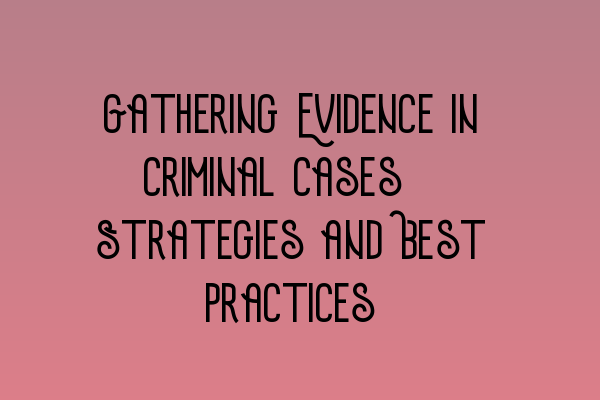Gathering Evidence in Criminal Cases: Strategies and Best Practices
Welcome to the SQE Criminal Law & Practice Law UK blog! In this post, we will discuss the crucial topic of gathering evidence in criminal cases. As a solicitor, understanding the strategies and best practices for gathering evidence is essential for building a strong case and achieving successful outcomes for your clients. Let’s dive right in!
The Importance of Gathering Evidence
In any criminal case, evidence plays a pivotal role in establishing the guilt or innocence of the accused. A thorough and comprehensive collection of evidence strengthens your argument and allows you to present a convincing case before the court. It is the foundation on which your case is built, and without it, your chances of success may be severely compromised.
Now, let’s explore some effective strategies and best practices for gathering evidence in criminal cases:
1. Conducting a Thorough Investigation
A successful gathering of evidence begins with a thorough investigation of the crime scene, witnesses, and all potential sources of evidence. This initial step allows you to identify key pieces of evidence that may be crucial to your case. Familiarize yourself with the crime scene, document any physical evidence, and interview witnesses to gather their statements. Every little detail counts!
To learn more about conducting effective investigations, check out our SQE 1 Practice Exam Questions article.
2. Collecting Documentary Evidence
Documentary evidence is a valuable resource in criminal cases. It includes documents such as contracts, emails, financial records, and more. Ensure to review all relevant documents and identify those that support your case. Make copies of important documents, organize them chronologically, and analyze their content for any inconsistencies.
If you need help with collecting documentary evidence, our SQE 2 Preparation Courses can provide you with comprehensive guidance.
3. Interviewing Witnesses
Witness statements are critical in criminal cases, as they provide firsthand accounts of the events in question. Interviewing witnesses is an art that requires excellent communication skills and attention to detail. Prepare a list of relevant questions, listen actively, and create a detailed record of their statements. Witnesses can provide invaluable insights that may strengthen your case.
To enhance your interviewing skills, consider reading our SQE 1 Preparation Courses article.
4. Engaging Experts
In complex criminal cases, engaging experts in various fields can be extremely beneficial. Forensic scientists, psychologists, handwriting analysts, and other experts can provide scientific analysis and expert opinions that can significantly impact your case. Collaborate with these professionals to gather evidence or seek their assistance during court proceedings.
For more information about expert engagement, read our article on SRA SQE Exam Dates that explores the importance of expert witnesses.
5. Adhering to Legal Requirements
While gathering evidence, it is crucial to adhere to all legal requirements and procedures. Improperly obtained evidence may be inadmissible in court, which can weaken your case. Familiarize yourself with relevant laws, rules of evidence, and regulations to ensure that all evidence collected is admissible and legally obtained.
If you want to assess your understanding of legal requirements, take a look at our SQE 1 Practice Mocks FLK1 FLK2 practice quizzes.
Conclusion
Gathering evidence is a critical component of criminal law practice. By following these strategies and best practices, you can enhance your ability to collect, analyze, and present evidence effectively in criminal cases. Remember to conduct thorough investigations, collect documentary evidence, interview witnesses, engage experts where necessary, and adhere to all legal requirements.
For more information and resources related to criminal law practice, stay tuned to our SQE Criminal Law & Practice Law UK blog!
